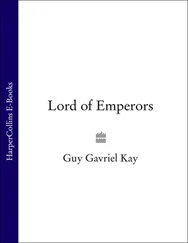She wonders if the assassin is dead yet.
SUN SHIWEI WOULD LOSE and regain consciousness, in considerable agony, throughout that night and into the first hours of the grey, windy morning that eventually came. He did, indeed, tell them what they wished to know. They did, indeed, ensure that he died accidentally under questioning.
LATER THAT MORNING, rain beginning to fall, eight members of the Imperial Palace Army presented themselves at the gates of the city mansion of disgraced Deputy Prime Minister Kai Zhen.
Seeing them, a small crowd gathered in the street. They backed away under orders from tense, irritated guards, but did not entirely disperse. Dogs paced and barked among them, hoping for scraps. Two of the dogs began to fight each other and were separated with curses and kicks. The rain continued.
Four of the guards went inside when the gates were opened. They emerged not long after. One spoke to their commander. It was obvious, even to those watching from a distance, that the leader was both angry and afraid. He could be seen slapping nervously at his thigh.
Eventually he barked orders, his voice thin in the thin rain. The same four guards went back in through the gates. When they came out again, two were carrying what appeared to be a body wrapped in linen. The leader continued to look unhappy. They marched away, in the best order they could manage, through a muddy street.
A story began to spread. That tended to happen in Hanjin. They had come to arrest Yu-lan, the wife of the deputy prime minister. She had apparently sent an assassin into the imperial clan compound the night before. This was deeply shocking. It was unclear why she had done so. The man had been captured and questioned in the night. He had named Lady Yu-lan before dying.
She had killed herself in her own house, rather than be taken away.
An understandable decision, in the circumstances. She might have hoped to be allowed burial in the family’s gravesite in the south. This was not to be. She was burned near the palace grounds and her ashes thrown into one of the canals.
The Cho teachings and those of the Sacred Path agreed that even if this created an unquiet spirit, it was not only permitted, it was necessary. Otherwise, how could the state truly punish (and deter) evildoers deserving of death? You needed to send that punishment beyond, into the spirit world. The souls of such criminals should not be granted rest.
Kai Zhen, disgraced and exiled, set forth from Hanjin two weeks later with his household (greatly reduced).
It was accepted that he’d had no part in what his wife had done, or tried to do. His exile was not unduly harsh, south of the Great River to the countryside near Shantong where he had a home among silk farms.
He lost his income and civil service rank, of course. Also, the many ways of supplementing wealth that had come with his position. But he’d had years in power, would be assured of a comfortable exile.
Journeying south, he wore mourning, left his hair unwashed and unbound, ate alone and sparingly, was seen to weep. He avoided his children, his concubines, any friends or followers who tried to see him as the family travelled into late, wet autumn and the weather began to turn colder. His grief for his wife was evident. Some declared it commendable after a long marriage; others that he was being excessive, deviating from right behaviour, proper restraint; still others that he was linking himself too closely with a murderous criminal, over and above his own errors.
LATE ONE COLD NIGHT, in a market town five days from the Great River, one of his concubines—not the youngest, but still young—takes upon herself what has to be considered a risk. She has been giving it thought for some time.
She goes from the women’s quarters of the house they have occupied and crosses in darkness, shivering in the courtyard, to where the men are sleeping. She goes to the doorway of the room Kai Zhen occupies. Taking a breath, she knocks softly, but then opens the door and enters without waiting for a response.
He is alone inside. There is a fire lit. She had seen light, knew he was not asleep. She would have gone in even if he was. He is at a desk, in a lined night robe, writing by lamplight. She doesn’t know what. She doesn’t care. He turns, surprised.
She forces herself not to bow. Standing very straight, she says what she has rehearsed. “You are the great man of our time. We are honoured to serve you, to be near you. It is a grief to me to see you this way.”
Saying to me is the important, dangerous, presumptuous part. She knows it. He will know it.
He stands up, setting down his brush. “Well,” he says, “just now, greatness does not seem to be part of my—”
“Greatness is within you.”
She interrupts him deliberately. She has a model for this. She has been in his household three years. She is skilled with flute and pipa . She is tall and thin and extremely clever. She has smooth skin, often commented upon.
She is also ambitious, more than she could (or would ever in her life) tell. The wife, the dead and gone wife, had often interrupted him when they were together, thinking they were unobserved.
“It is … it is gentle of you to—”
“Gentle?” she says. And takes two small steps nearer. This, too, she has observed done by the wife. The dead wife. It was like a dance, she remembers thinking, a kind of ritual between them. Affairs of men and women often are, she has found.
He straightens his shoulders, turns fully to her, away from the desk.
“When tigers come together in the forests,” she says, “is it meant to be gentle?”
“Tigers?” he says.
But his voice has changed. She knows men, knows this man.
She doesn’t speak again. Only comes up to him, those small steps, as if gliding. She is wearing a scent taken from the mansion when they left. It had belonged to the wife (the dead wife). That is another risk, but risks do need to be taken, if you want anything of life.
She reaches up, both hands, draws his head down to hers.
Bites him on a corner of the lower lip. Not gently. She has never done that, has only seen it, unobserved.
Then she moves her mouth to his ear and whispers words she has been thinking about, devising, for days and days as they travelled.
She feels him respond, his breath catching, his sex hardening against her body. Her satisfaction in having been right is deeply arousing.
She services him that night on the chair by the desk, on the floor, the bed, and takes her own (real) pleasure more intensely than she ever has before, when she was only one concubine among many, terrified she might be overlooked, disappear into the wasted, empty years of a life.
Those fears are over by the time morning comes.
It is said, at the country estate where they settle, and more widely, later, that she is in some terrifying way the ghost of Yu-lan—never permitted burial—come back into the world.
He marries her in springtime. You didn’t have to observe full mourning rites for someone declared a criminal. His sons are unhappy but say nothing. What are sons going to say?
She has two of the women whipped with bamboo rods that winter for whispering about her, and one pretty, too-intelligent younger concubine is branded—on the face—and dismissed.
She doesn’t mind the ghost idea being cast abroad, in furtive murmurs or wine talk. It gives her another kind of power: association with a dangerous spirit. Power over him, over all of them.
Her name is Tan Ming and she matters . She is determined that everyone will know this before the end, whenever, however that comes. She lights a candle and prays every morning, without fail, for Yu-lan. Her husband thinks she is being virtuous.
Читать дальше












